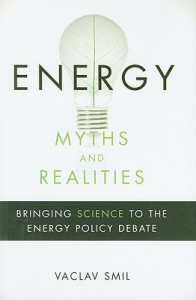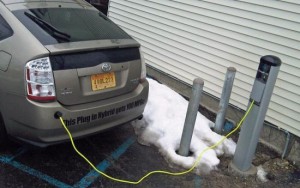 This week I decided to bone up on some energy 101 so I read “Energy Myths & Realities” by Vaclav Smil, an energy scientist. He discusses eight myths and attempts to set the record straight by disseminating the true facts around the issues. He believes several of the myths have been mired in the past while others are perpetuated by the media.
This week I decided to bone up on some energy 101 so I read “Energy Myths & Realities” by Vaclav Smil, an energy scientist. He discusses eight myths and attempts to set the record straight by disseminating the true facts around the issues. He believes several of the myths have been mired in the past while others are perpetuated by the media.
For example here is one myth that he demystifies: Electric cars will replace conventional cars in the near future. The reality according to Smil: Electric cars are expensive, their adoption rate will be slow, and internal combustion engines will dominate the market for decade to come. He also believes that EVs will not provide much, if any, energy savings.
So why does it matter if there is discourse among energy advocates? Because, says Smil, these incorrect facts and fallacies are hampering the development of effective new energy policies and wasting time and money that could be better used in pursuit of a constructive, scientific approach to the global energy challenge.
Here are some other myths that Smil addresses, all dished up as solutions, or part of a solution for our energy woes.
• The world will soon run out of oil.
• Carbon sequestration is the solution to global climate change.
• Ethanol will replace gasoline as a significant source of automobile fuel.
• Wind power will soon become the world’s leading source of electricity.
I’ll play my hand here and agree with Smil that carbon sequestration is not a solution. In fact, I believe it is a multi-billion dollar farce. Yet where I diverge with Smil is while he believes various forms of alternative energy should have no role, or will only play a small role, I think it’s shortsighted to ignore parts of the energy portfolio that are right in front of us. But I digress.
Let’s take a moment to review in more detail how Smil presents biofuels. He hates them. All forms of them – first gen, advanced, cellulosic, algal, you name it. For algae in particular he writes, “In this ‘gold rush for algae,’ their authors extrapolate bench-scale experiments under perfectly controlled growing conditions to massive outdoor ponds, some advocates even suggesting yields that are thermodynamically impossible. This only confirms that the contest between energy myths and realities never ends.”
He concludes, “More important than the fact that liquid biofuels cannot displace refined oil products in transportation is that they should not.” {Emphasis the author’s.}
 Smil is less harsh when he discusses wind and does believe it could play a role, just not to the extent people claim. He writes that expect for relatively small regions, wind energy cannot become the single largest source nor the dominant role of generation.
Smil is less harsh when he discusses wind and does believe it could play a role, just not to the extent people claim. He writes that expect for relatively small regions, wind energy cannot become the single largest source nor the dominant role of generation.
I suppose a book about energy myths doesn’t have to offer up any solutions. Regardless of whether or not I believe he is perpetuating new myths, there is interesting information about various forms of energy and some insights on the proper course of action to take for a successful energy transition. I’ll share one with you here. “First, distrust any strong, unqualified claims regarding the pace, timing, and extent of future adoption of new energy sources or the diffusion and performance of new energy conversions techniques.”
While I have never denied that I am a supporter of alternative energy, I do agree with Smil’s last point. Over exaggerating product claims is in no ones best interest and the renewable energy industry has engaged in this practice numerous times. This tactic actually hurts the cause. And as support for renewable energy and the programs that support it are under fire, the industry needs to do everything possible to maintain its credibility.

